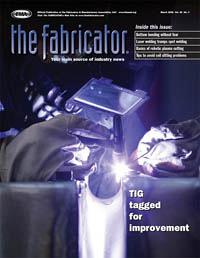Editor-in-Chief
- FMA
- The Fabricator
- FABTECH
- Canadian Metalworking
Categories
- Additive Manufacturing
- Aluminum Welding
- Arc Welding
- Assembly and Joining
- Automation and Robotics
- Bending and Forming
- Consumables
- Cutting and Weld Prep
- Electric Vehicles
- En Español
- Finishing
- Hydroforming
- Laser Cutting
- Laser Welding
- Machining
- Manufacturing Software
- Materials Handling
- Metals/Materials
- Oxyfuel Cutting
- Plasma Cutting
- Power Tools
- Punching and Other Holemaking
- Roll Forming
- Safety
- Sawing
- Shearing
- Shop Management
- Testing and Measuring
- Tube and Pipe Fabrication
- Tube and Pipe Production
- Waterjet Cutting
Industry Directory
Webcasts
Podcasts
FAB 40
Advertise
Subscribe
Account Login
Search
Editorial Advisory Board Roundtable
The education of the fabricating industry
- By Dan Davis
- March 7, 2006
- Article
- Shop Management
The FABRICATOR's Editorial Advisory Board gathered to discuss the current skill sets for fabricating and forming employees and which areas need improvement.
When fabricators get busy, the cries for skilled labor grow louder. Unfortunately, many OEMs and job shops aren't having the best of luck finding the employees they need to ensure a smooth transition as fabricating operations start to expand.
The National Association of Manufacturers has issued a report calling for awareness of this issue, and the impending retirement—whether forced or elective—of thousands of baby boomers is a demographic reality that may lead to further concern about the lack of skill in tomorrow's work force.
So what's the reality in today's world of manufacturing? The FABRICATOR invited members of its Editorial Advisory Board together to discuss the situation. Roundtable contributors were:
- Matt Gehman, general manager, Metal Locking Service, Buffalo, N.Y., a specialist in cast-iron repair
- Joe Griffin, assistant general manager, Aerofab, Indianapolis, a component manufacturer and repair shop for the aerospace industry
- Muammer Koc, assistant research scientist, University of Michigan, Mechanical Engineering Department, Ann Arbor, Mich.
- S. Manivannan, quality operating coach/assessor, Ford Motor Co., Allen Park, Mich.
- Gary Morphy, project engineer, Vari-Form, Strathroy, Ont., Canada, a producer of hydroformed parts for the automotive industry
- Roger Schulz, former director of purchasing for an Illinois manufacturer of hardware products
Here is an edited transcript of the roundtable discussion that occurred during the 2005 FABTECH International/AWS Welding Show in Chicago.
| "The company that I work for is a union shop, but we don't pull out of a union hall. We have to hire directly off the street. That means that we are responsible for all training and the cost." —Matt Gehman, Metal Locking Service |  |
How do you gauge North American metal fabricating and forming workers in terms of their current skill sets?
S. Manivannan:"Two years ago I was working with Ford on the supply chain side and with stamping. I know that Tier 1 stamping companies were having a tough time finding the right people to help them. I know of several times they went to the community colleges and local universities to find who they could, but they didn't have much success.
"It's tough, especially with the engineers."
Joe Griffin:"At Aerofab our current skill sets are very strong. As a matter of fact, we have been approached on a couple of occasions to do some turnkey processes, get the manufacturing processes up and running, and export them to another facility.
"We do work internationally in the repair sector, and through one of our company's partnerships, we host employees from other companies and do training at our facility on sheet metal fabrication and custom fabrication. So we feel pretty good about our skill set."
Matt Gehman:"We are kind of unique. I'm here representing three different companies in our organization, two of which are union and one which is not union. The company that I work for is a union shop, but we don't pull out of a union hall. We have to hire directly off the street. That means that we are responsible for all training and the cost. We are just looking for people that show up five days a week and work eight hours a day. That's our biggest challenge.
"We have a lot of turnover in our place. It's unfortunate. We lost four people this month alone. And surveys have shown that it's not salary or pay. We are working a lot of hours, a lot of overtime, and it's a demanding job. We're not sheet metal. We're heavy industrial. So it's physically demanding, and the young people don't want to get into that."
| "We do work internationally in the repair sector, and through one of our company's partnerships, we host employees from other companies and do training at our facility on sheet metal fabrication and custom fabrication. So we feel pretty good about our skill set." — Joe Griffin, Aerofab |  |
Roger Schulz:"Our company is a nonunion shop, and it's strictly metal stamping and assembly. And the skill sets required are minimal. We still have a difficult time finding people that want to work 40 hours a week. They seem to want to work for three days and then take off a day because it's a nice day. So that's a problem.
"But across North America, I think our employees probably have broader and better skill sets than most people in the world simply because they have been exposed to more technology than others in developing countries."
Gary Morphy:"Our company is pretty much a Canadian company. We are selling to companies in the U.S., but there is no manufacturing outside of Canada. However, there is some assembly in Mexico.
"We are in a little bit more specialized labor market. We employ close to 400 people, and it's in a town of 13,000 people. There are a couple of larger cities not that far away—London is 350,000 and Sarnia is 70,000. So we draw a number of workers from London, but most of our welding is being done by robots. If we are doing repairs, it's being done manually, but otherwise, normal production is done by robots. We find the training with robots to be pretty good."
What characteristics would you like to see entrants into the fabricating and forming field display more?
MG:"For us, it's strictly work ethic. We know that we just can't hire people that have the skill we are looking for. It's a 100 percent trainable skill. It's totally unique. So all we need are people that are willing to put in the time and effort to learn a new trade. We have to have them show up and be open to learning something new."
Have local educational institutions been able to help with training?
MG:"There used to be a regional training program for machinist/metalworking training, but that dried up with some fiscal problems in our area. That program moved on and was picked up by a local college, but that was eventually dropped because of lack of interest. So now it's fully on the backs of the employers in the area to sponsor those programs for people who are interested."
| "In many of these cases, rather than technology or changes in skill sets or education, we are talking about culture change, not only in the work force, but also in the corporate suite." — Muammer Koc, University of Michigan, Mechanical Engineering Dept. |  |
Is anyone else having to take on more training efforts?
JG:"We do because we are so diversified. We do thermal coatings, heat treating, and welding. And it's for top-level aerospace applications.
"They have to be a certified welder, a machinist, or someone that has an air frame and power plant [A&P] license, which is a result of a two-year associate degree program. Those people with the A&P license have very good mechanical skills, and they seem to be adaptable to just about anything."
So is it appropriate to call the dearth of skilled workers a "crisis"?
SM:"I'm not sure. I keep hearing about outsourcing, but in the meantime, I'm hearing about workers that don't want to work 40 hours and they want to take days off."
RS:"I would challenge the use of the word "crisis.' I think that too many employers are looking for "step-right-in' employees as opposed to developing a qualified employee after an acclimation period. I don't think there are very many people that can just hire someone, have him step right in, and everything will work out tomorrow. But there are a number of people out there who would be qualified after they got acclimated to what they were supposed to be doing on a particular job.
"I don't know necessarily if it's a crisis. Goodness knows that we have lost so many jobs in metal fabricating to overseas markets that there has to be hundreds of people out there looking for jobs. You just have to find them. The problem is they may not be in your neighborhood."
SM:"He is right about the downsizing and loss of jobs. And nowadays very few employees have all the skills they need. Let's look at a guy running a press. He can have significant experience, but when you implement lean or Six Sigma, then he needs some additional training. So the company may be looking to hire a skill set that also includes experience in these quality programs. That may be a roadblock."
RS:"I think there is a question of how adaptable the employees are today. That's a big issue. Are they rigid and see only through a narrow view? Are they adaptable to change?"
| "I lived in Europe, and I saw that they are building a structure for vocational training. And I can say that they are much better with that than the U.S." — S. Manivannan, Ford Motor Co. |  |
JG:"Backing up just a little bit, when it comes to opportunities to reach out to displaced workers, we have used local temporary services, and we have found a lot of good people through that. If these people are out there and are really willing to work, they will go to these services and make themselves available.
"I've found that a lot of these people, especially the senior employees, who are working through a temporary service are really eager to get out there and do something different. We've had some luck there."
RS:"We have temporary employees right now in our factory simply because the hardware industry is so unpredictable. And, unfortunately, our customers give us no lead-time. We actually run on a 10-day lead-time, from order to shipment. So we have temps working throughout the plant. But our full-time employees are all trained and capable of working any particular job within the company. There is no set assignment. They don't run the same press every day. They work in teams, and they work by themselves. It depends on what's on the schedule to be manufactured."
SM:"I just wonder about the use of the temporary services. You train them for six to eight months, and when the cost-cutting comes, the temporary contracts are the first ones to go. That's the first thing company management does. It's easy."
JG:"I work for a privately owned company, and we have had two minor layoffs in the whole time I've been there.
"What we do is that we bring people into a certain pool and give them some minor training to see if they have the attitude and aptitude. If they show us that they are go-getters, we'll start looking for a specific job to place them in and then give them the training."
Based on our previous discussion, are North American educational institutions properly preparing students for careers in manufacturing?
SM:"I lived in Europe, and I saw that they are building a structure for vocational training. And I can say that they are much better with that than the U.S. I lived in Scandinavia, but it also applies to other places, such as Germany. There are some lessons to be learned and there are some things to be benchmarked."
| "Automation has its place, and automation can do some things better and more reliably than people. But automation is not the whole answer because you still need the spark from someone who will say that this isn't the right way to make this part or it's more economical to make a part this way." —Gary Morphy, Vari-Form |  |
GM:"So much of this comes down to kids and young adults deciding what's cool to do for a living. Certainly, a lot of manufacturing jobs aren't in the cool category, whether we like to acknowledge it or not.
"And to see such a preponderance of people go into other professions. Legal is a big one. Are they using their skills for the betterment of society?"
RS:"There is so much political activity in educational programs today that it's hard to tell. We put so much emphasis on teaching to the test. It's absolutely amazing how much school time is taken up with mandatory state testing.
"Do we need more trade schools? Probably. Should there be less emphasis on college prep in our high schools? Probably. Most Asian and European countries have separate and distinct tracks for students. Maybe that is what we should do."
GM:"Getting politics out of education, unfortunately, is a much easier thing to say than to do."
JG:"You need a good blend in educational offerings. I teach at Indiana University-Purdue University in Indianapolis, and they like me because I give a tour right off the bat. I expose these young people to a lot of different applications.
"Obviously, they are in the engineering, mechanical, and technology programs, but a lot of the educators in the system don't have a lot of real-world experience. So they are trying to draw from what they are reading in a textbook or something somebody told them. Incorporating real-world experience in education is a twist that we need to look at."
| "I think there is a question of how adaptable the employees are today. That's a big issue. Are they rigid and see only through a narrow view? Are they adaptable to change?" — Roger Schulz, Former Purchasing Executive |  |
How would you rank North American educational institutions in terms of preparing people for technical careers or engineering careers?
RS:"I think for the professional careers, the schools do just fine. But for the nonprofessionals who are going to be on the factory floor, I think the educators need to take a different approach."
MG:"I think they are doing poorly. The guidance counselors recommend and the kids coming out of high school think they need four-year degrees. But that four-year degree today is going to get you [the equivalent of] a high school education 20 years ago, if you know what I mean. You get that four-year degree, and that's just your starting point in college. Then you have to go on and get your graduate work done. Then you get the people that get through that, but they have no practical, real-world experience whatsoever. Graduates can calculate stress loads on a beam, no problem, but if you ask them to get you a 12-inch 13 hex head cap screw, they don't have a clue what you are talking about.
"Then the other extreme is that you have the kids coming out of high schools that think if they can't get through a four-year college program, why even start. And they won't even take the vocational route to get the basic, real-world education.
"I think they have to find the happy medium where you have the right blend of vocational work and the professional work, because America is not going to be only a service-oriented economy. It has to maintain some level of manufacturing to keep pace."
JG:"We need to make these types of jobs more glamorous. Whether you like TV or not, these garage shows with the custom bike builders and the Jesse James types have their fans. And in our industry I see people come in and say that they want to make aircraft parts and work with sheet metal. Now whether that's because of the TV shows or not, I'm not sure, but it's kind of exciting to see some of these changes in trends."
With the average age of shop floor workers increasing, do you see a problem with the impending loss of manufacturing knowledge that won't be easily replaced?
JG:"We do at Aerofab. I think the tribal knowledge is very critical, and that's what you are going to lose if you don't have that transition lined out."
MG:"Our one group does a lot of architectural sheet metal—heavy polished, mirror-finished stainless work. Trying to get gained knowledge passed down is like pulling teeth. The first thing they look at is job security. They think, "This guy is going to steal my job, or this guy is going to take my overtime because he is at a lower rate.' So that is a real difficult thing, trying to get the older, more experienced guys to pass on that knowledge."
SM:"I know at Ford when the company lays off workers and then hires contract workers, three months later the company has quality problems because the knowledge and expertise are gone."
Muammer Koc:"Then you try to replace that knowledge base with technology, which itself is just a tool. You need the operator to run it."
JG:"I don't know if anyone read The Toyota Way, but that's what Toyota is working on. The quality culture is ingrained as part of the company, but as the culture changes, they are worried about losing that tie. And that's one of the company's main focuses—trying to stay competitive and keep the next generation tuned in to what happened and how that started. They started the company with that culture, and we're trying to implement that now."
Will technology developments in equipment help to overcome that?
MG:"Maybe a little bit. But we equate our shop employees' skills to blacksmithing. It's an art, especially on the polishing side."
GM:"Automation has its place, and automation can do some things better and more reliably than people. But automation is not the whole answer because you still need the spark from someone who will say that this isn't the right way to make this part or it's more economical to make a part this way."
MK:"One of the things that I have observed in my experiences is that the Internet is now being used by some companies to deliver information down to the plant floor. When it comes to adjustments that are needed for the equipment, the answers can be found online. Some companies are offering that, so you don't have to have an expert on-site."
Is more advanced technology an alternative to training a new generation of fabricating and forming employees?
RS:"That's the biggest danger that U.S. manufacturers face: the absence of manufacturing in America. You can't imagine how many different products and processes have been invented while trying to make something else."
JG:I've got a sticky note now to prove it."
RS:"Think about how many things that have been accidentally invented while trying to make something else. I think that's a major issue in the U.S. We will lose our innovation if we don't manufacture. If we are strictly a service economy, we will lose all those capabilities.
MG:"We've become a society of machine operators. Operators and machinists are not synonymous terms. If you can run a CNC machine, all you are is a guy that can push a button and import that program. You are as far away from a machinist as the guy sitting on the packaging skids.
"Technology advancements are great, but then you become reliant on that and you lose skill sets. It's like the calculator: Who needs to know how to do math if you have a calculator?
"Good machinists are getting very, very hard to come by in our area as well."
MK:"In many of these cases, rather than technology or changes in skill sets or education, we are talking about culture change, not only in the work force, but also in the corporate suite.
"If you have workers or engineers who have basic knowledge and, more than that, they embrace change, then you can go with him or her and do many things. Improve your technology, and if he or she is willing to work, then you can keep them.
"But in the Michigan area, with the companies that I deal with, the engineers are very reluctant to go into new areas. They are tired of everything. They have lost the momentum.
"If you work with companies in Europe or Asia, their workers want to do everything. They say, "Tell me what you want and I'll do it.' They don't look at these changes as a burden; they want the experience. At the same time, the corporations and employers, they treat them equally well because they know that the workers are capable of learning new things.
"On the corporation side, they should also change their attitude. Think of the employees as members of their family."
What needs to change to make the future brighter for tomorrow's fabricating and forming work force?
GM:"If you change two things tomorrow, it will change our perspective on this totally. Those two things would be long-term thinking—a substitute for short-term thinking—and work ethic. The first I would lay at the feet of companies; the second I would lay at the feet of workers.
"Lack of long-term thinking is huge because it's behind so many of the problems at Delphi, Ford, and so many other companies.
"And when people don't want to do the work, it can be outsourced to people who do want to do the work."
MK:"Basically, we are talking about the attitudes of the workers and the corporations. Both need changing."
About the Author

Dan Davis
2135 Point Blvd.
Elgin, IL 60123
815-227-8281
Dan Davis is editor-in-chief of The Fabricator, the industry's most widely circulated metal fabricating magazine, and its sister publications, The Tube & Pipe Journal and The Welder. He has been with the publications since April 2002.
subscribe now

The Fabricator is North America's leading magazine for the metal forming and fabricating industry. The magazine delivers the news, technical articles, and case histories that enable fabricators to do their jobs more efficiently. The Fabricator has served the industry since 1970.
start your free subscription- Stay connected from anywhere

Easily access valuable industry resources now with full access to the digital edition of The Fabricator.

Easily access valuable industry resources now with full access to the digital edition of The Welder.

Easily access valuable industry resources now with full access to the digital edition of The Tube and Pipe Journal.
- Podcasting
- Podcast:
- The Fabricator Podcast
- Published:
- 04/16/2024
- Running Time:
- 63:29
In this episode of The Fabricator Podcast, Caleb Chamberlain, co-founder and CEO of OSH Cut, discusses his company’s...
- Industry Events
16th Annual Safety Conference
- April 30 - May 1, 2024
- Elgin,
Pipe and Tube Conference
- May 21 - 22, 2024
- Omaha, NE
World-Class Roll Forming Workshop
- June 5 - 6, 2024
- Louisville, KY
Advanced Laser Application Workshop
- June 25 - 27, 2024
- Novi, MI































